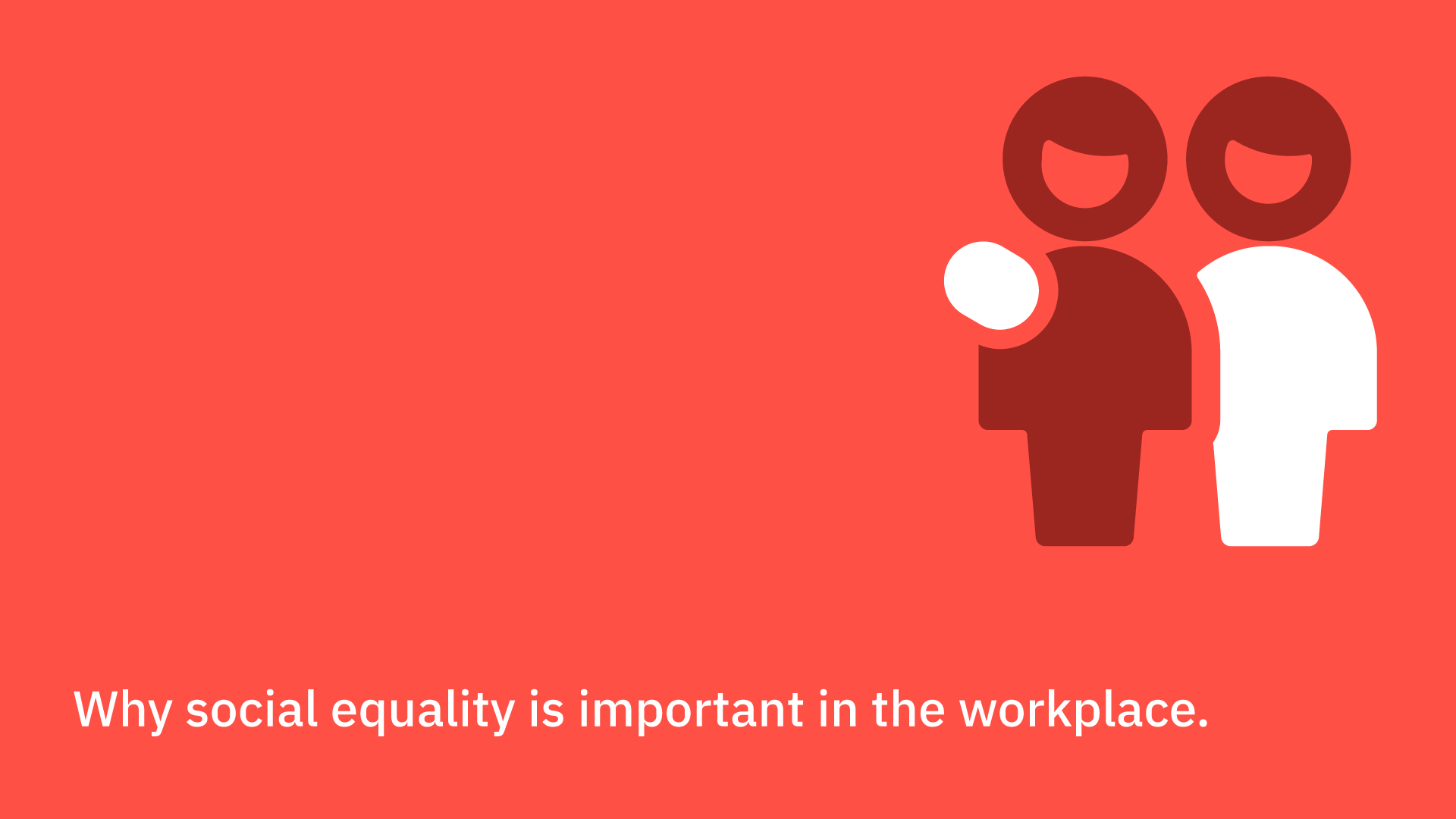
Why social equality is important in the workplace.
Updated on November 14, 2024
The pursuit of social equality within the workplace has emerged as a critical imperative. Far beyond mere buzzwords, concepts like diversity, inclusion, and equity are shaping the very fabric of organizational success. We’ll delve into the multifaceted reasons why social equality is not just desirable but essential for fostering thriving and productive work environments. From boosting employee morale and innovation to attracting top talent and ensuring ethical business practices, the impact of social equality resonates across all facets of an organization.
What is social equality?
Social equality refers to a state of affairs where all individuals within a society have equal rights, liberties, and status, regardless of their background or identity. This includes:
- Equal rights: Everyone has the same legal and civil rights, such as the right to vote, freedom of speech, and protection from discrimination.
- Equal liberties: Everyone has the same freedoms and opportunities to pursue their goals and live their lives as they choose, without facing unfair barriers or restrictions.
- Equal status: Everyone is treated with the same respect and dignity, and no one is given preferential treatment based on their social group or characteristics.
Social equality aims to eliminate social hierarchies and ensure that all individuals have a fair chance to participate fully in society and reach their full potential. It goes beyond just preventing discrimination and seeks to create a society where everyone feels valued and has the opportunity to thrive.
How does this translate to the workplace?
Now that we know what it is in the broader world, how does this idea apply to your job? Well, in the workplace, social equality means that all employees, regardless of their background, identity, or social group, have:
- Equal Opportunities: Everyone has the same access to jobs, promotions, training, and development opportunities. No one is excluded or disadvantaged due to their race, gender, ethnicity, religion, sexual orientation, disability, or any other personal characteristic.
- Fair Treatment: Everyone is treated with respect and dignity, and no one is subjected to harassment, discrimination, or bullying. All employees have the right to a safe and inclusive work environment where their contributions are valued.
- Equal Pay: Everyone receives fair and equal compensation for work of equal value. There are no pay gaps based on gender, race, or other factors.
- Equal Voice: Everyone has the opportunity to express their opinions and ideas, and their perspectives are considered and respected. All employees feel empowered to participate in decision-making processes that affect their work.
Social equality in the workplace is about creating a level playing field where everyone has a fair chance to succeed based on their merit and abilities. It fosters a sense of belonging, boosts morale, and encourages collaboration and innovation. By embracing social equality, organizations can tap into the full potential of their workforce and create a more productive and harmonious work environment.
What are some examples?
Recruitment and hiring
One key way to ensure a fair hiring process is through blind resume reviews. By stripping away identifying details such as names and photos, the focus shifts solely to the candidate's skills and experience, thereby minimizing unconscious bias.
Additionally, creating diverse interview panels, comprised of individuals from a variety of backgrounds and perspectives, can further promote fair evaluation by reducing the influence of any single viewpoint.
Companies can also take proactive steps to reach out to candidates from underrepresented groups by partnering with organizations and communities that serve these populations. This targeted outreach helps to ensure a broader pool of qualified applicants and a more equitable hiring process overall
Compensation and Benefits
To truly embrace social equality, organizations must proactively address potential pay disparities. This involves conducting regular pay equity audits to identify and rectify any gaps based on gender, race, or other factors.
In addition, transparency is key – providing clear information about salary ranges for each position fosters fairness and minimizes negotiation disparities that can disproportionately affect certain groups. Furthermore, offering flexible work arrangements like remote work or flexible hours demonstrates a commitment to accommodating the diverse needs of employees and promoting a healthy work-life balance for everyone.

Development and Advancement
Investing in the development and advancement of employees from underrepresented groups is crucial for promoting social equality in the workplace. Mentorship and sponsorship programs can pair these individuals with experienced senior leaders who can offer valuable guidance and support as they navigate their career paths. Additionally, targeted leadership development training programs can equip them with the skills and confidence needed to step into leadership roles. By intentionally identifying and developing high-potential employees from diverse backgrounds, organizations can ensure a pipeline of future leaders that reflects the diversity of their workforce and society as a whole.
Culture and Inclusion
Fostering a sense of belonging and providing avenues for advocacy are also key elements of promoting social equality. Employee Resource Groups, or ERGs, allow individuals to connect based on shared identities or interests, creating a supportive community within the larger organization.
Simultaneously, ongoing diversity and inclusion training for all employees helps raise awareness about unconscious bias, microaggressions, and the importance of inclusive communication. This fosters a more welcoming and respectful environment for everyone. Underpinning these efforts is a clear and enforced zero-tolerance policy for discrimination and harassment, coupled with accessible reporting mechanisms and a commitment to swift action on any complaints.
Additional examples
Apart from everything above, here is some general advice that you can follow even if you’re not a part of a company.
Creating a truly inclusive workplace also means considering the physical environment and company culture. Ensuring physical accessibility for employees with disabilities, through features like ramps, elevators, and accessible restrooms, demonstrates a commitment to accommodating everyone's needs. Using gender-neutral language in all communications and policies helps avoid reinforcing stereotypes or excluding anyone, fostering a more welcoming environment for all genders.
Moreover, recognizing and celebrating the diverse cultural and religious holidays and traditions of employees goes beyond mere tolerance; it actively promotes understanding and appreciation for the richness that different backgrounds bring to the workplace. By embracing these practices, organizations can create a space where everyone feels not only included but also valued for their unique perspectives and contributions. This, in turn, cultivates a sense of belonging and encourages employees to bring their authentic selves to work, fostering a more vibrant and dynamic workplace culture.
By implementing these and other practices, organizations can foster a truly inclusive and equitable workplace where all employees feel valued, respected, and empowered to reach their full potential.
In conclusion.
The pursuit of social equality within the workplace isn't merely a moral imperative; it's a strategic advantage that unlocks the full potential of every employee, fostering a thriving and innovative environment. From ensuring equal opportunities and fair treatment to investing in the development of individuals from all backgrounds, creating a truly inclusive workplace demands a multifaceted approach that encompasses policies, practices, and culture.
At Transcom, we're all about building a team where everyone feels like they belong and their ideas matter. We know that having people from all walks of life makes us stronger. If you're looking for a job where you can be yourself, grow, and make a real difference, check out what Transcom has to offer. We're building a future where everyone has a seat at the table
